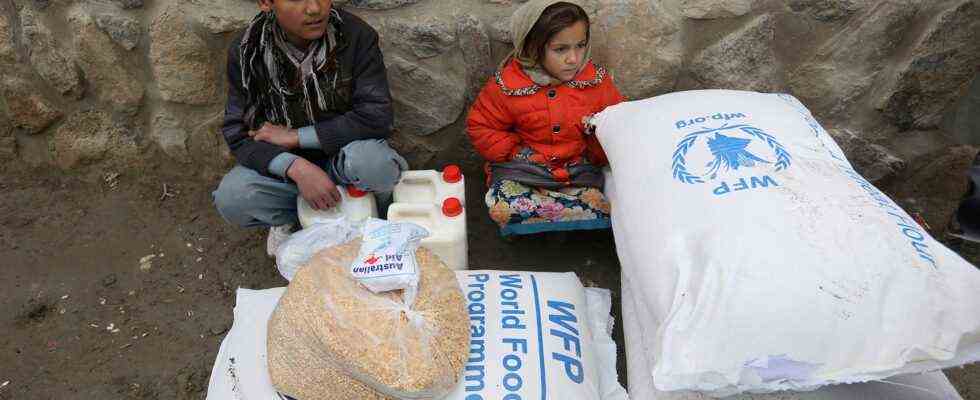Status: 09/01/2021 8:19 p.m.
Millions of Afghans depend on food from the United Nations. Deliveries are said to continue even though the Taliban are now in power. But the country’s reserves are running out – financing is precarious.
It is already dark in Afghanistan when Andrew Patterson connects from his office in Kabul. The internet connection is bad, it keeps breaking off. Patterson is the United Nations World Food Program Deputy Regional Director for Afghanistan.
He stayed while many other western foreigners left the country as quickly as possible. Because he and his colleagues have a mission. “14 million people in this country do not have secure access to food. Over two million children are malnourished. We are trying to bring food to them.” Still, even after the Taliban came to power.
“We decide who needs help”
Yes, of course, the situation is difficult, says Patterson. Especially in Kabul, around the airport, the security situation is not good. But paradoxically, in his view, the rest of the country has tended to become safer. There is less fighting. Patterson’s composure may also be due to his organization’s experience of the regimes that changed hands in Afghanistan.
The World Food Program has been active in Afghanistan since 1963. Employees have seen Soviets, mujahideen, Taliban and Western troops control the country. “We’ve been distributing food in Afghanistan all through the past few years as the Taliban began to control various areas of Afghanistan, especially in rural areas,” Patterson said. A few weeks ago, the Taliban had practically controlled the entire country, with the exception of the large metropolitan areas.
The fact that the airport is currently unusable is also not decisive for the World Food Program: 60 percent of the food that employees distribute comes from within Germany. The rest is brought to Afghanistan by land from Uzbekistan, Pakistan or Turkmenistan.
Food, dietary supplements or even money – everything goes directly to individuals or families, not to dubious regional governments, emphasizes Patterson. “We distribute on the basis of humanitarian principles: neutrality, independence and humanity. And we do not accept any restrictions. We decide who needs help. And then deliver.”
Negotiations with local Taliban
What the takeover of power by the Taliban means in concrete terms for the work of the aid workers on the ground is still unclear, says Patterson. The conditions under which NGOs can work have not yet been determined. The distribution of food has started again in most regions, only in Herat and Kabul there are major problems.
And then there is still the question: what happens next with women? “20 percent of our employees are women. We would like more and we also want those we hire to be able to come to work to be able to do their normal tasks,” says the regional director.
In some places they would have noticed minor restrictions. “That means we have to negotiate with the Taliban.” On the one hand, this happens locally – with local Taliban leaders, in Herat, Kandahar or Mazar-i-Sharif. The Taliban also have an NGO commission that is the point of contact for all aid organizations.
Two droughts in three years
For Patterson, the biggest problem is another one: funding. Because the World Food Program, which is based in Rome, has only a very small budget, it is dependent on donations from states, companies or private individuals. Patterson and his team urgently need $ 200 million to feed those hungry at least until the end of the year.
The situation is dramatic, he says. “We will soon run out of food reserves in the country. We are spending the supplies we have received. So we need supplies.” In addition, winter is just around the corner. There is also a drought – the second in three years. “The yield is down 40 percent, the local plants haven’t grown or carried,” Patterson explains.
Above all, the money must flow quickly so that the World Food Program can shop again. Otherwise the food will run out by the end of September or beginning of October, Patterson fears.
Aid to Afghanistan – World Food Program is not giving up
Lisa Weiß, BR, September 1, 2021 7:22 pm

